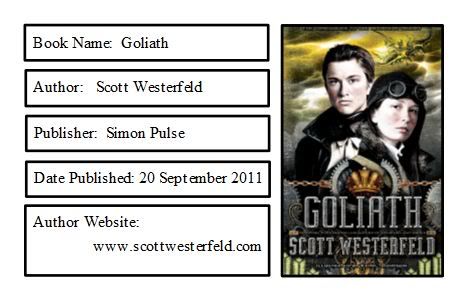
Alek and Deryn are on the last leg of their round-the-world quest to end World War I, reclaim Alek’s throne as prince of Austria, and finally fall in love. The first two objectives are complicated by the fact that their ship, the Leviathan, continues to detour farther away from the heart of the war (and crown). And the love thing would be a lot easier if Alek knew Deryn was a girl. (She has to pose as a boy in order to serve in the British Air Service.) And if they weren’t technically enemies.
The tension thickens as the Leviathan steams toward New York City with a homicidal lunatic on board: secrets suddenly unravel, characters reappear, and nothing is at it seems in this thunderous conclusion to Scott Westerfeld’s brilliant trilogy.
This was an excellent end to Westerfeld’s World War I alt-history steampun k trilogy. Based on the premise “what if Darwin had continued his studies and discovered genetics and genetic engineering?”, the series is set in a world where genetically mutated monsters fight battles with huge mechanical devices. In the midst of it all Deryn serves on a war-blimp whale, all the time hiding the fact that she’s a girl because only boys can serve in the war. Alek is the prince of a key mechanical nation, but he fled Austria after his parents were assassinated and he has now found asylum with the ship and Darwin’s granddaughter, a geneticist named Dr. Barlowe. This book is a great way to end a trilogy.
*****Spoilers*****
I like how Deryn’s gender secret is revealed to Alek towards the beginning of the book so that we can see the repercussions and reactions of Alek instead of at the end where we’re left to guess. The two characters develop a better relationship despite the plot twists of trying to stop the war before it destroys all of Europe. A really good part of these books are how both Deryn and Alek have strengths and weaknesses and the plot utilizes both of them to use their strengths to get out of hairy plot twists and to progress the story. Although the romantic relationship is a little immature, the characters are also immature so I thought it was rather realistic. The book’s only weak point is that Tesla is a rather odd choice for a villain, and I never thought his motivations for world domination were adequate to what he was doing. The book does include a lot of these early 19th century historical figures, and I found it fun and educational to see who popped up next. In all, a good book and a great end, and I’m very sad that there won’t be any more of these books, but I look forward to following Westerfeld on to an entirely new world.

No comments:
Post a Comment